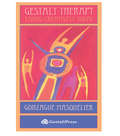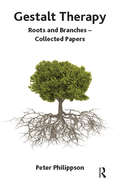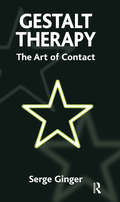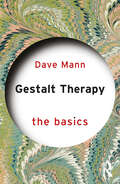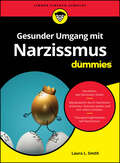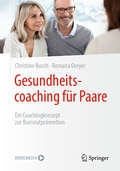- Table View
- List View
Gestalt Therapy: History, Theory, and Practice
by Dr Ansel L. Woldt Dr Sarah M. TomanGestalt Therapy: History, Theory, and Practice is an introductory text, written by major Gestalt theorists, that will engage those new to Gestalt therapy. Editors Ansel Woldt and Sarah M. Toman introduce the historical underpinnings and fundamental concepts of Gestalt therapy and illustrate applications of those concepts to therapeutic practice. The book is unique in that it is the first Gestalt text specifically designed for the academic and training institute settings. Gestalt Therapy takes both a conceptual and a practical approach to examining classic and cutting-edge constructs.
Gestalt Therapy: Living Creatively Today
by Gonzague MasquelierHow can we reconcile our desire for freedom with the limits or routines that orgainize our existence? How do we affirm our personality while adjusting to the world? How can we be nourished by exchanges with others without losing our autonomy? Gestalt Therapy responds to these essential questions of our daily lives. An important branch of humanistic psychology, Gestalt Therapy emphasizes the importance of communication and contact, the ways that we maintain relationships with ourselves, others and our environment. It helps individuals to develop potential by going beyond rigid patterns and to finally become creators of their own existence, each of us creating our own life rather than merely submitting to it. Gonzague Masquelier presents the history of fifty years of the Gestalt movement as well as its development in today's world. He begins with the story of its founders: Laura and Fritz Perls, and their associate, Paul Goodman. He explains how this unique therapeutic path developed little by little, through the meeting of European existentialism with American pragmatism. Then, he clearly explains the principal concepts which form the basis of this approach, illustrated by numerous clinical examples taken from his own professional experience. Finally, the author reviews the current areas of practice of the Gestalt approach: not only individual or group psychotherapy, but also within organizations, executive board rooms and the training professions. He offers an excellent synthesis of differing aspects of this important perspective within the field of psychology today.
Gestalt Therapy: Perspectives and Applications
by Edwin C. NevisGestalt Therapy: Perspectives and Applications is a classic text which, when it was first released in 1992, signaled a renaissance of Gestalt scholarship throughout the world. In this volume, Edwin Nevis, one of the foremost Gestalt writers, thinkers, and practitioners of the last 40 years, skillfully draws together a diverse selection of essays from Gestalt therapists of every persuasion, united here by the clarity of their thought, and the constancy of commitment to the development and extension of the Gestalt model. Here you will find one of the finest overviews of classical Gestalt therapy theory and practice available: groundbreaking essays on such topics as diagnosis and ethics from a Gestalt perspective, and an assortment of pragmatic clinical essays of immediate value to the working practitioner.
Gestalt Therapy: Practice and Theory
by Margaret P. Korb Jeffrey Gorrell Vernon Van De RietAn outstanding overview of Gestalt theory and practice -- from the history of its philosophical development to current trends in its theoretical explorations and clinical applications. An essential text. Gestalt Therapy Practice and Theory includes comprehensive subject and author indexes and the most up-to-date selection of references available.
Gestalt Therapy: Roots and Branches - Collected Papers
by Peter PhilippsonThis book is a collection of articles written in the period 1985–2011. The articles form a background for perspectives that concern the foundations of Gestalt therapy: foundations in philosophy and foundations in psychoanalysis and connections with other therapeutic theories.
Gestalt Therapy: The Art of Contact
by Serge GingerGestalt Therapy has been developing steadily for the last 50 years, in America as well as in Europe. It is cureently practieed in diffeeent eettings: individual, group, and family therapies; personal growth; social, medical and business organizations.
Gestalt Therapy: The Basics (The Basics)
by Dave MannGestalt Therapy: The Basics provides an accessible and concise overview of the approach and its substantial theory.Experiential exercises, clinical vignettes and examples from everyday practice are included to enrich understanding of gestalt’s theory and its clinical application. This book explores: the history of gestalt therapy, gestalt maps, philosophical beliefs, creative experimentation and ethical considerations. Useful chapter summaries are featured throughout to aid comprehension.This book is essential reading for gestalt trainees, as well as counsellors and psychotherapists wanting to learn more about the gestalt approach.
Gestalt in Pastoral Care and Counseling: A Holistic Approach
by Jeffrey D HamiltonGestalt in Pastoral Care and Counseling is the only book to provide you with an integrated model of pastoral care and counseling from the perspective of Gestalt theory. Covering all aspects of ministry, including visitation, counseling, worship, and administration, it is a valuable text for advanced undergraduate or graduate classes and small group or individual study for seminaries, church ministries, pastoral counseling training programs, and lay pastoral ministry programs. This book will increase your confidence in your work, help you understand blockages as well as avenues of change, and lead you to a more creative, yet consistent, stance in your ministry.Gestalt in Pastoral Care and Counseling makes clear that all of ministry is, in fact, pastoral in nature. It demonstrates the principles of Gestalt in pastoral ministry in a gradual manner, true to both Gestalt principles and your needs. Some of the topics you learn about include: key elements of Gestalt theory, from the early developers through more recent practices the cycle of experience--a model that provides an understanding of the various steps involved in change on all levels Gestalt applications in pastoral counseling, worship, and administration a theology of pastoral caring--a model for pastoral ministry based on the relational aspects of the Biblical narrative and its application in ministry ideas for continued growth based on daily life experienceWith well-developed presentations of Gestalt principles and pastoral ministry, Gestalt in Pastoral Care and Counseling provides you with a new perspective on the meaning of pastoral ministry. Not only will you learn new skills, you will also develop a new appreciation for what can occur within pastoral relationships. The theoretical basis of Gestalt embraces the whole of life experience as part of the process of change and growth and holds sacred the relationship that exists between persons. As your understanding and use of these principles increases, the quality of care and counseling you provide in your ministry will continue to improve.
Gestalt in Social Work: Case Studies in Practice
by Armin Schachameier Ulrich Reichert Tom BreitenfeldtThis book deals with key situations in social work and reflects on them from the perspective of the Gestalt approach, which has enormous potential for consulting practice. The Gestalt approach has so far played a minimal or no role in social science courses (social work, psychology) as well as in the practice of social work. This book makes the Gestalt approach accessible to a wider audience so that specialists can expand their methodological repertoire accordingly. The authors see professionalism as a continuous, lifelong process that consists of training, reflection and research in specific practical situations. With this volume, they open up a learning path for readers, conveying a didactic concept so that readers can acquire methodological skills for conducting consultations. Based on the authors' experiences dealing with the topics of depression, addiction, codependency, parenting advice, trauma/dissociation and psychosis, short video recordings, commented transcriptions and summary graphics have been created to explain the basic relationship dynamics and approaches to action. This learning material can be used by students and practitioners in the field of the social work, but it is also would interest anyone who is involved in consulting and coaching in other areas. The focus is on reenacting and reflecting on practical situations based on cases. In role plays, students or professionals put themselves in the shoes of clients and consultants. Through these case reflections, basic conversation dynamics on specific topics can be both experienced as well as understood. Approaches can be tried out in order to expand the methodological repertoire for practice. Gestalt in Social Work: Case Studies in Practice is primarily intended for students, lecturers, professors, teachers and practitioners of social work. Readers in the fields of psychology and psychotherapy (doctors, psychiatrists, psychotherapists), Gestalt therapists and trainers, and consultants in other related fields also would find the book of interest. The translation of the original German version of this book into English was done with the help of artificial intelligence. The authors (with the friendly support of a bilingual psychologist) have subsequently revised the text further in an endeavour to refine the work stylistically.
Gestaltpsychologie kompakt: Grundlinien einer Psychologie für die Praxis (essentials)
by Herbert FitzekDie Gestaltpsychologie wurde vor 100 Jahren entwickelt, um die akademische Psychologie für die Fragen der Praxis an die Wissenschaft vom Erleben und Verhalten öffnen: Wie kommt es, dass sich aus der Vielfalt von Eindrücken Erfahrungen bilden? Wie kommen wir zu Problemlösungen? Wie werden Spannungen abgebaut? Was bestimmt unser Handeln? Daraus wurde ein Konzept, das komplexe Wirkungszusammenhänge von einem einheitlichen Denksystem darstellen kann: der Analyse des im aktuellen psychischen Feld konkret Wirkenden und Sinnmachenden. Heute ist die Gestaltpsychologie präsent in der Psychotherapie, in der Wirtschafts- und Kulturpsychologie wie auch im interdisziplinären Diskurs des systemischen Denkens, der Organisationstheorie und der Wirtschaftsästhetik. Im Buch wird das Konzept in seiner historischen Entwicklung vorgestellt und mit den Fragen konfrontiert, denen sich eine praxistaugliche und ,,praktische Theorie" stellen muss.
Gestalttherapie
by Lotte Hartmann-Kottek Uwe StrümpfelAls psychotherapeutisches Verfahren fasziniert die Gestalttherapie durch ihr unmittelbares, erlebnisorientiertes Vorgehen. In dem Band stellt die Autorin den Ansatz systematisch und zugleich praxisnah vor: Die theoretischen Grundlagen werden erläutert, Ergebnisse der Wirksamkeitsforschung diskutiert und die Anwendung der Methoden anhand von Fallbeispiele demonstriert. Dabei finden unterschiedliche Anwendungsbereiche und Settings wie Einzel- und Gruppentherapie, Familienaufstellungen oder Gestalttherapie für Kinder und Jugendliche Berücksichtigung.
Gestaltungskompetenzen für gesundes Arbeiten
by Monique Janneck Annekatrin HoppeDieses Buch beschreibt Ansätze, Arbeit in Zeiten der Digitalisierung, komplexer Umwelten und des demografischen Wandels so zu gestalten, dass die Ziele der Organisation, die Arbeitsaufgaben und die Bedürfnisse der einzelnen Mitarbeiter/-innen in Einklang gebracht werden: Durch die Möglichkeit individueller Gestaltungskompetenz. Denn nur wenn Arbeit Gestaltungsspielraum bietet und zu den Zielen, Stärken und Leidenschaften der Mitarbeitenden passt, können diese gesund bleiben und zu den Organisationszielen langfristig beitragen. Im vorliegenden Band werden Konzepte und Maßnahmen zur Förderung von Gestaltungskompetenzen vorgestellt – in großen Unternehmen sowie auch für Selbständige.
Gesture: Visible Action as Utterance
by Adam KendonGesture, or visible bodily action intimately involved in the activity of speaking, has long fascinated scholars and laymen alike. Written by a leading authority on the subject, this book draws on the analysis of everyday conversations to demonstrate the varied role of gestures in the construction of utterances. Publication of this definitive account of the topic marks a major development in semiotics as well as in the emerging field of gesture studies.
Gesund bleiben in kranken Unternehmen: Stressfaktoren erkennen und Resilienzkompetenz aufbauen
by Michaela Moser Karin HäringResilienz ist in der Arbeitswelt ein zentraler Schutzfaktor im Umgang mit Stress. Dennoch liegen nur wenige gesicherte Erkenntnisse über die psychische Gesundheit von Fach- und Führungskräften vor, die sich in einem krankmachenden Unternehmensumfeld bewegen. Unternehmen können als kranke Systeme bezeichnet werden, wenn zwischen der Organisation und ihren Mitgliedern toxische Verbindungen auf der Führungs-, Kollegen- und Gruppenebene entstehen. Das Buch stellt daher die Frage in den Vordergrund, an welchen Merkmalen kranke Unternehmenssysteme erkannt werden können und welche Maßnahmen der Einzelne ergreifen kann, um Schutzfaktoren aufzubauen und seine Resilienz zu stärken.
Gesunde Führung: Gesundheit, Motivation und Leistung fördern
by Alexander Häfner Lydia Pinneker Julia Hartmann-PinnekerFragen auch Sie sich, wie Sie als Führungskraft sowohl Mitarbeitergesundheit wie auch Arbeitszufriedenheit und Motivation erhalten und verbessern können?In diesem Buch finden Sie anregende Fragen, Fallbeispiele und Tipps für Ihren Führungsalltag. Psychologisch fundiert nutzen die Autoren ihren reichen Fundus an praktischen Erfahrungen in der Aus- und Weiterbildung von Führungskräften um Ihnen praxisnah alle wichtigen Aspekte gesunder Führung zu vermitteln.Sie lernen über den Einfluss grundlegender Haltungen und erfahren, warum Wertschätzung, Lösungsorientierung und Fairness ebenso wichtig sind, wie der Umgang mit Konflikten, die motivierende Aufgabengestaltung oder die Teamkoordination. Alle Inhalte drehen sich um gesundes Führungsverhalten und die Einstellungen und Sichtweisen dahinter. Dabei integriert gesunde Führung verschiedene Ansätze, die nicht nur für die Mitarbeiterzufriedenheit und -gesundheit hoch relevant sind, sondern generell gute Führung ausmachen.Die Zielgruppen:Dieses Buch richtet sich an alle Führungskräfte, die in ihren Teams Leistung auf gesunde Art und Weise fördern möchten.Auch HR-Verantwortliche, Trainer, Wirtschaftspsychologen, Personalentwickler, Mitarbeiter im Gesundheitsmanagement, Betriebsärzte und Betriebsräte werden von diesem Werk profitieren. Da es keine besonderen Fachkenntnisse voraussetzt, ist es für alle eine Bereicherung, die sich für Führung in Organisationen interessieren.
Gesunde und sozial nachhaltige Organisation von Arbeit nach der Pandemie
by Johanna MuckenhuberIn dem Band wird diskutiert, wie sich die Arbeitsorganisation im Verlauf der Covid-19-Pandemie verändert hat: Welche Aspekte hybrider und digitalisierter Arbeit längerfristig bestehen bleiben, wie sich diese auf die ArbeitnehmerInnen auswirken und wie diese nachhaltig im Sinne eines ganzheitlichen Gesundheitsbegriffs gestaltet werden können. Neben der konkreten Arbeitsorganisation werden dabei auch Aspekte sozialer Sicherheit im Spannungsfeld mit erhöhter Flexibilität in der Arbeitswelt analysiert.
Gesunder Schlaf und die innere Uhr: Lebensstilbedingte Schlafstörungen und was man dagegen tun kann
by Angela SchuhIn diesem Sachbuch erfahren Sie, warum guter, ausreichender und erholsamer Schlaf essenziell für Ihre Gesundheit ist. Zu wenig und schlechter Schlaf macht übergewichtig und krank. Aber jeder Zweite schläft nicht gut, unter den Erwerbstätigen in Deutschland schlafen sogar 80 % schlecht. Einer der wichtigsten Gründe für nicht organisch bedingte Schlafstörungen ist unser Lebensstil. Wir sind komplexen Belastungen in Arbeit und Privatem ausgesetzt. Und unser Umgang damit bewirkt phasenweise eine Störung der inneren Uhr (Chronobiologie). Folge: zunächst Schlafprobleme, psychische Belastung, akute oder chronische Erkrankungen. Dieses Buch befasst sich nicht nur mit den wissenschaftlichen Erkenntnissen, sondern gibt praktische und lebensnahe Anleitungen für einen guten und gesunden Schlaf. Fragen und Antworten aus dem Inhalt: Was passiert mit uns im Schlaf, und was bedeutet Schlaf für unsere Gesundheit? Wie hängen guter Schlaf und die innere Uhr zusammen? Was muss man beachten, um seine innere Uhr nicht zu stören? Welcher Lebensstil fördert gesunden Schlaf? Wie bereite ich mich auf den Schlaf vor? Was mache ich, wenn ich nicht einschlafen kann oder nachts aufwache? Über die Autorin: Prof. Dr. Dr. med. habil. Angela Schuh beforscht an der Ludwig-Maximilians-Universität München die Zusammenhänge von Lebensstil, Gesundheit und Schlaf und zeigt: Guter und ausreichender Schlaf ist machbar.
Gesunder Umgang mit Narzissmus für Dummies (Für Dummies)
by Laura L. SmithGroßartig – leider oft auf Kosten anderer Narzissten erscheinen anfangs oft charmant, doch Partner, Freunde, Arbeitskollegen oder Familienmitglieder leiden oft unter diesen sehr speziellen Persönlichkeiten. Vermuten Sie, dass Sie selbst oder jemand in Ihrem Leben ein Narzisst ist, und möchten mehr darüber erfahren, wie Narzissten ticken? Laura L. Smith stellt typische Verhaltensweisen von Narzissten vor und erläutert die Warnzeichen, auf die Sie achten sollten. Sie bekommen Tipps, wie Sie sich vor narzisstischer Manipulation schützen können. Das Buch hilft Ihnen, sich aus narzisstischen Verstrickungen zu lösen, und erklärt die Möglichkeiten, wie Narzissmus behandelt werden kann. Sie erfahren Wie ein Mensch zum Narzissten wird Wie Sie im Umgang mit Narzissten Ihren eigenen Selbstwert bewahren können Wie Sie sich aus den Fängen von Narzissten befreien können Wie Psychotherapie bei Narzissmus hilft
Gesunder Umgang mit toxischen Menschen für Dummies (Für Dummies)
by Daniela VoigtWirksamer Schutz gegen Manipulation, Machtspiele und Missbrauch Das manipulative Verhalten von toxischen Menschen kann Ihr Selbstvertrauen erschüttern und Ihnen gesundheitlichen wie psychischem Schaden zufügen. Lernen Sie die Techniken und Tricks von Narzissten, Soziopathen und Psychopathen kennen, um sich schützen oder aus ihren Fängen befreien zu können. Für jede toxische Konstellation – sei es zwischen Eltern und Kindern, in Partnerschaften, mit Vorgesetzten oder in Freundschaften – finden Sie charakteristische Merkmale. Gleichzeitig entdecken Sie wirksame Strategien, um emotionale Turbulenzen sicher zu überstehen, toxischen Missbrauch abzuwehren und Ihre Gesundheit zu schützen. Sie erfahren: Wie toxische Menschen »ticken« Wie Sie manipulative Strategien wie Lovebombing, Gaslighting und Hoovering erkennen Welche Abwehrtechniken funktionieren (und welche nicht) Wie Sie sich und ihre Psyche schützen
Gesundheit systematisch fördern: Von der Absicht zur Realisierung (essentials)
by Wolfgang SchlichtWolfgang Schlicht stellt in diesem essential die wesentlichen Erkenntnisse der Implementierungsforschung vor. Er zeigt die Komplexität von Interventionen auf, die gesundes Verhalten aufbauen, riskantes Verhalten reduzieren oder das Gesundheitsverhalten behindernde Umweltbarrieren beseitigen wollen. Um die Wahrscheinlichkeit ihrer Wirkung zu erhöhen und vorhandene Ressourcen effizient zu nutzen, sollten sie systematisch erfolgen. Die methodischen Hintergründe, die notwendigen Werkzeuge und erforderlichen Schritte des komplexen Intervenierens werden in diesem essential in ihren Grundzügen erläutert.
Gesundheit zwischen Fasten und Fülle: Warum Nahrungsverzicht Gehirn, Geist und Körper jung hält
by Ulrike GebhardtIn diesem Buch erfahren interessierte Laien, wie sie durch eine leicht veränderte Ernährungsweise nicht nur dem Körper, sondern auch Gehirn und Geist Gutes tun können. Mediziner raten dazu, hin und wieder auf Nahrung zu verzichten – und das nicht nur in der Fastenzeit. Aber warum soll eine Kalorienreduktion gesund sein? Tatsächlich mehren sich die Hinweise darauf, dass Fasten auch dem Gehirn und der Psyche gut tut: Der Sparstoffwechsel wirkt wie ein Antidepressivum und kurbelt das neuronale Recycling an. Die Enthaltsamkeit beim Essen könnte sogar Demenz vorbeugen. Aus dem Inhalt: Überfluss – Verzicht – Leben im Wechsel zwischen Fülle und Verzicht. Über die Autorin: Dr. Ulrike Gebhardt ist promovierte Biologin und Wissenschaftsjournalistin. Sie schreibt mit Begeisterung über Themen aus den Bereichen Biowissenschaften und Medizin. Bei der Beschäftigung mit dem Thema Fasten hat sie beschlossen, wieder ein längeres Übernacht-Fasten einzulegen.
Gesundheitscoaching für Paare: Ein Coachingkonzept zur Burnoutprävention
by Christine Busch Romana DreyerIn diesem Buch finden Sie ein detailliertes Manual für ein Gesundheitscoaching. Sie können damit Ihre Klienten in der zunehmend entgrenzten und beschleunigten Arbeitswelt unterstützen, ihre Work-Life Balance zu erhalten und Erschöpfungszustände zu vermeiden. Work-Life Balance, Erholung und Wohlbefinden hängen maßgeblich von der sozialen Unterstützung des Partners ab. Das Blended Coaching richtet sich an Paare und umfasst sowohl Präsenzsitzungen als auch digitale Anteile, durch Onlinekurse und Tele-Coachingsitzungen.Das Coachingkonzept beruht auf dem Züricher Ressourcen Modell nach Storch und Krause (2017) und dem ergebnisorientierten Coaching nach Greif (2008). Der wesentliche Wirkmechanismus im Coaching ist die wahrgenommene soziale Unterstützung des Partners bei der Selbstreflexion, Zielfindung und Umset- zungsplanung des gewünschten Verhaltens sowie dem Transfer in den Alltag. Damit stellt das Coaching selbst eine gemeinsame Erholungsaktivität für das Paar dar, stärkt die Kommunikation des Paares und dient dem Aufbau von „Erholungsinseln“ zur Burnoutprävention. Das Konzept wurde mit Unternehmerpaaren von Kleinbetrieben des Handwerks entwickelt und erfolgreich erprobt.
Gesundheitsförderliche Kommunikation: Bedingungen eines gesunden Austausches im Alltag
by Susanne Krugmann Bernhard BorgettoKommunikation ist eine Voraussetzung menschlichen Zusammenlebens – dennoch kann sie der Gesundheit schaden oder sie fördern. In diesem Buch wird ein Modell gesundheitsförderlicher Alltagskommunikation entwickelt, das die Bedingungen und Anforderungen enthält, die einen gesunden Austausch im Alltag ermöglichen. Grundlage dafür sind einerseits einschlägige Erkenntnisse und Modelle aus den Gesundheits- und Kommunikationswissenschaften sowie der Logopädie/Sprachtherapie und andererseits die Ergebnisse empirischer qualitativer Experteninterviews.
Gesundheitsfördernde Organisationsentwicklung: Theorien, Ergebnisse und Ansätze
by Rahim Hajji Katharina Kitze Nadine PieckDas Buch geht der Frage nach, wie gesundheitsfördernde Organisationsentwicklung aus verschiedenen Perspektiven konzipiert und realisiert werden kann. Es werden differenzierte Ansätze, theoretische Zugänge, empirische Ergebnisse, Interventionen und Methoden mit dem Blick auf Gesundheit in Organisationen vorgestellt. Es beschäftigt sich unter anderem mit den Fragen: Wie kann die gesundheitsfördernde Organisationsentwicklung aus verschiedenen Perspektiven beschrieben werden? Wie sieht Personalentwicklung unter Berücksichtigung der gesundheitsfördernden Organisationentwicklung aus? Welche Ursachen, Formen und Praktiken von betrieblichem Gesundheitsmanagement gibt es aus Sicht einer gesundheitsfördernden Organisationsentwicklung? Wie sehen die gesundheitlichen Belastungen und Beanspruchungsfolgen in Unternehmen aus? Welche rechtlichen Rahmenbedingungen existieren für das betriebliche Eingliederungsmanagement bei der Gestaltung gesundheitsfördernder Organisationen? Welches Führungsverständnis und Führungsverhalten ist im Kontext einer gesundheitsfördernden Organisationsentwicklung nötig? Welche Implikationen für die gesundheitsfördernde Organisationsentwicklung entstehen aus der agilen Organisationsentwicklung?
Gesundheitsförderung und Prävention für Menschen mit Demenz: Grundlagen und Interventionen
by Doris Gebhard Eva MirWelche Gesundheitsressourcen haben Menschen mit Demenz und wie können diese gezielt gefördert werden? Dieses Buch bietet erstmalig einen multiprofessionellen Einblick in die Beantwortung dieser Fragestellung. Experten aus dem deutschsprachigen Raum präsentieren und diskutieren neben zielgruppenspezifischen theoretischen Grundlagen die aktuelle Interventionslandschaft. Dabei wird eindrucksvoll aufgezeigt, wie beispielsweise Bewegung, Sexualität oder Humor zur Aktivierung von Gesundheitspotentialen beitragen können. Das Buch bietet neben praktischen Beispielen auch eine kritische Auseinandersetzung mit der Evidenzlage und Methoden der Evaluation von gesundheitsfördernden und präventiven Maßnahmen für Menschen mit Demenz. Darüber hinaus werden Handlungsempfehlungen für Wissenschaft und Praxis formuliert, die dazu ermutigen und befähigen, mehr Gesundheit, Freude und Lebensqualität in die Alltagswelt von Menschen mit Demenz zu bringen. Das Buch richtet sich an Pflegepersonen, Altenbetreuer, Praktiker aus dem Bereich der Gesundheitsförderung, Ärzte, Psychologen, Ergotherapeuten, Physiotherapeuten und andere Gesundheitsberufe sowie Angehörige.

